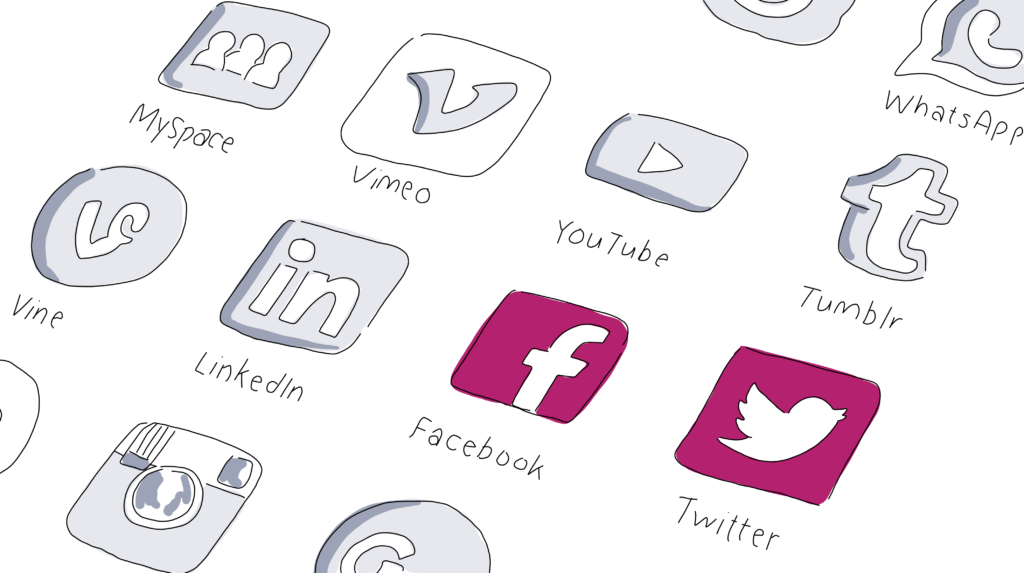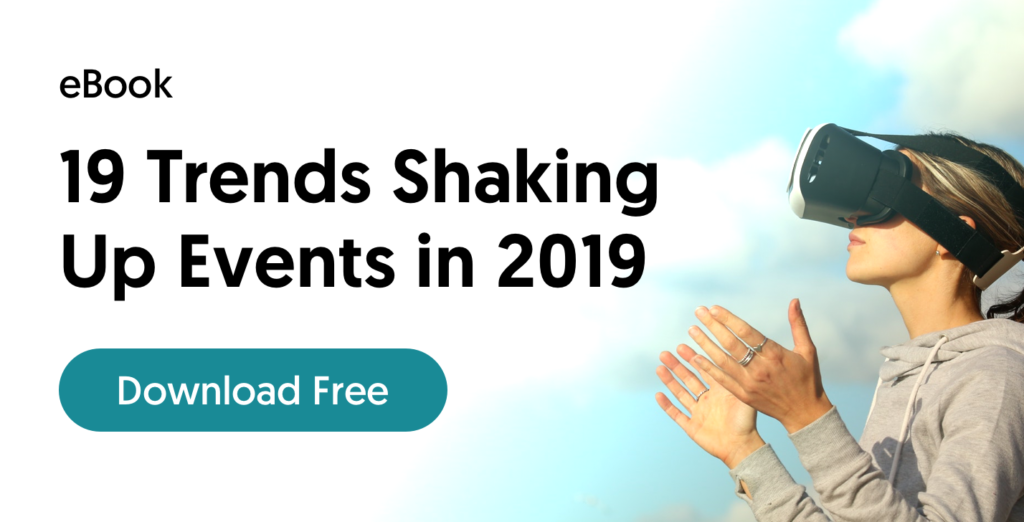
Monday Motivation: Awesome B2B Event Marketing Ideas
Want to create marketing for your B2B event that people will actually love? Here’s how to make higher quality content, implement better marketing strategy, and achieve your event registration goals.
Why Many B2B Event Marketing Ideas Fail
Despite best intentions and research, not every marketing idea (B2B, event, or otherwise) is going to hit it out of the park. Most fall prey to the same mistakes – which is great news because you can easily learn what not to do from others.
The three biggest mistakes most b2b event marketers make are: 1. Neglecting to quantify marketing ROI, 2. not understanding your customer base, and 3. forgetting to align your marketing goals with your actual event goals. Read on to learn how to overcome all the typical errors, and tap into the latest successful b2b event marketing trends.

How to Set the Best B2B Event Marketing Objectives
No matter what event you plan to host, there are goals you should keep in mind throughout the planning process. Having concrete and realistic event objectives will guide your decision making. But not every marketer knows exactly what they’re striving towards. Here’s how to translate business goals into event goals and how to get specific enough to be successful.
Increase sales.
While increasing sales might be the end goal, you’ll need to pick more specific event objectives to aim for and measure for yourself before, during, and after the event. Things like achieving a certain number of new, qualified leads or the monetary value of the sales pipeline the event creates make for good starting points. To excel in this arena you’ll need to pay attention to: tickets sold, CRM updates, and newsletter sign ups.
Build your brand.
Simply hosting an event is enough to build your brand, right? Well, not exactly. At the end of the day you need to find better, more quantifiable results to know how your audience responded to the event. Goals like these should aim for social media followers, website traffic, and media coverage from major outlets as signs of success. For these goals you’ll want to lean on SEO and web analytics for deeper insight.
Engage customers.
Sometimes you just want to make an event that gets your customers more involved with your brand in one way or another. Or maybe you’re launching a new facet of your business that needs a little more user activity. Either way, the best methods turning this big idea into a tangible goal is to focus on things like event or brand app downloads, social media mentions, and live poll participation. Really anything that directly requires an audience member to perform an action related to your brand (that isn’t necessarily a sale) falls into this category.
Learn more about setting the right event goals and objectives here. With your great event goals in mind, it’s time to take a closer look at how some of these strategies play out in the real world. Using successful B2B events as examples, let’s dive into what you can apply to your future event marketing practices.
B2B Event Marketing Trends to Harness This Year
The latest and greatest in event marketing shows us exactly what we should focus on between now and next year. Even if you only implement one of these trends you’ll see a positive impact on your business. These methods are great because they’re tried and true but new enough that audiences are still really excited about them. So strike while the iron is hot with these great B2B event marketing trends:
- Digital Gift Bags. Attendees will love the ebooks, product coupon codes, exclusive featured speaker webinars, and other high value content you send them during the conference. And sponsors will love that they can quantify their event ROI through link tracking and download numbers.
- Podcast Marketing. Podcast statistics show that business related topics are among the top five most popular genres. If you’d like to podcast for your event, all you really need is a decent mic, a recording program or app, and something relevant to talk about.
- Brunch. Turn any corporate event into a tasty get together by hosting a catered brunch for all your guests! This trend is especially effective if you’re trying to win over Millennials.
- Live Streaming. Live video marketing is now considered a must have for marketers. The majority of audiences would rather watch a video than read a blog post about your event. Plus you can always recycle content from your livestreams into an educational video series for YouTube, clips for social media, and gated, lead generating webinars.
- Influencer Marketing. 65% of global brands are strongly considering increasing their influencer marketing investments by 2020. Collaborate with trusted industry experts to make your content and you’ll see an increase in audience engagement as well as overwhelming support from your fanbase.
Now that you have these awesome marketing tactics on your list, let’s take a look at what other brands are doing to generate buzz for their corporate events.

3 B2B Event Marketing Ideas From Leading Brands
How do you promote a B2B event? By pulling off great strategy, sharing awesome content, and creating something innovative of course! Here are some excellent brands who did exactly that with their corporate event marketing.
1. SAP Sapphire Now
For the latest and greatest in emerging technologies (including IoT, AI, and blockchain) it doesn’t get much better than the Sapphire Now and ASUG Annual Conference. Hosted in Orlando, Florida, the B2B event presents a multi-day affair complete with hands-on seminars, keynote speakers, and a number of impressive exhibitors. For this large scale event, SAP had to attract attendees interested in staying for the entirety of the conference since one day passes are not an option.
So how did they do it exactly? Besides being in a lucrative and interesting niche, the event marketing team put out a number of great resources that are both event specific and highly educational – a B2B industry trend that is already quite popular (for good reason). Their event page features keynote highlights, general session replays, and a highlight reel of the biggest industry announcements. The best part is it’s all available for free!
Main Takeaway: Consumers value highly actionable, relevant content. Creating and promoting educational materials from previous events was especially smart, because Sapphire Now is all about current industry trends. So information from last year’s session is very informative and helpful to viewers who may not have attended previously.
But even more importantly, that information might be a little outdated. So if viewers love the content from last year’s conference and are interested in keeping up with the latest technologies, they’ll be sure to attend the next iteration.

2. Gartner CSO & Sales Leader Conference
Gartner, the world’s leading research firm and prestigious awards entity, hosts an annual conference dedicated to visionary sales leaders. Their semi-recently rebranded event now includes a large sector of their target market in the name, which is a smart move for a brand that has a foothold in a huge variety of industries. But one of the best marketing tactics they’ve used is their website and, more specifically, the page that explains why their event is worth the investment.
Simply labeled, Why Attend, prominently featured webpage choose to directly address the most obvious question all attendees have when they visit the site. True to their informative and straight-to-the-point branding, the page lays out the following: a bulleted list of key event initiatives, a highlight video from the previous year’s event, the exact professional titles of their most ideal attendees, and some hard stats and data (of course).
Main Takeaway: Being clever with your marketing is always a good thing but sometimes the most interesting choice you can make is to stop beating around the bush and just tell people why your event is so awesome. This is especially true if your niche is broad or your industry already has a lot of similar (and really popular) events. Dedicate a space on your website, in an email newsletter, or on your social media profiles to share the following:
- A video from last year’s event
- Past event data that showcases your main selling points
- Detailed descriptions of benefits past attendees have gained
- A list of professions and titles that will benefit the most from attending
- And, of course, a list of actionable event takeaways every attendee can look forward to
3. Dreamforce
Dreamforce is an event hosted by Salesforce, the famous CRM with critical praise from Forbes, Fast Company, Fortune, and more. Their main event is an annual conference tailored to professionals in the digital and tech spaces. Attendees enjoy a lot of speakers, info sessions, and even parties. In addition to being a well planned event, Dreamforce’s B2B event marketing takes the cake when it comes to social media, especially Instagram.
Dreamforce’s Instagram account is actual event marketing #goals. Complete with a polished and color-coordinated feed, strategically categorized Stories, and plenty of drool-worthy IGTV videos, Dreamforce is a terrific example of how to use social media to market your B2B event. They do a great job of maximizing every available feature on the platform and you can easily check out more related content by tapping the event hashtag conveniently located in their bio.
Main Takeaway: Instagram isn’t just for B2C events. In fact, when done well, social media platforms that were previously seen as off limits for B2B trade shows and conferences can actually be used to effectively stay top of mind with audiences, provide new ways to engage attendees, and establish a brand identity. Use all available platform features alongside polished videos and images to really pack a punch.
Need more inspiration? You can find 17 more amazing event marketing examples here.
Now You’re Ready to Make Your B2B Event a Success
Much of the same principles that apply to B2C event marketing also apply to B2B event marketing. The main difference is you need to establish clear value for attendees. You’ll also need to get creative with relating to your audience before, during, and after the event itself. With these ideas in mind, be sure to also check out these tips on KPI for event ROI beginners and how to effectively include co-branding in your event marketing plan.

